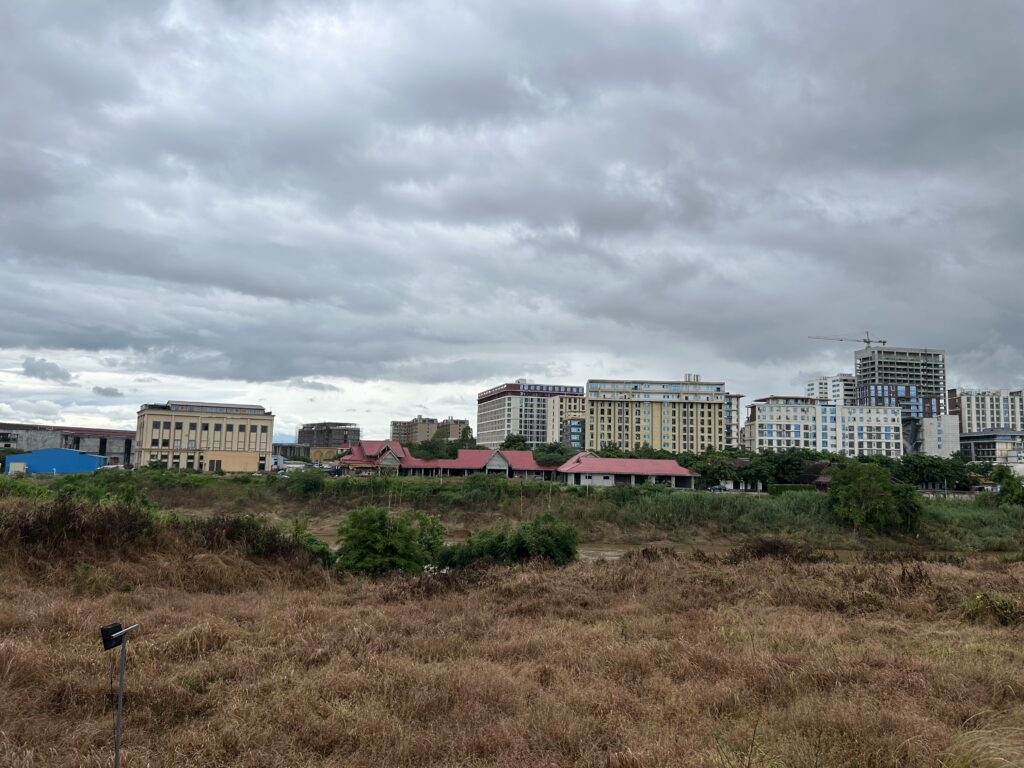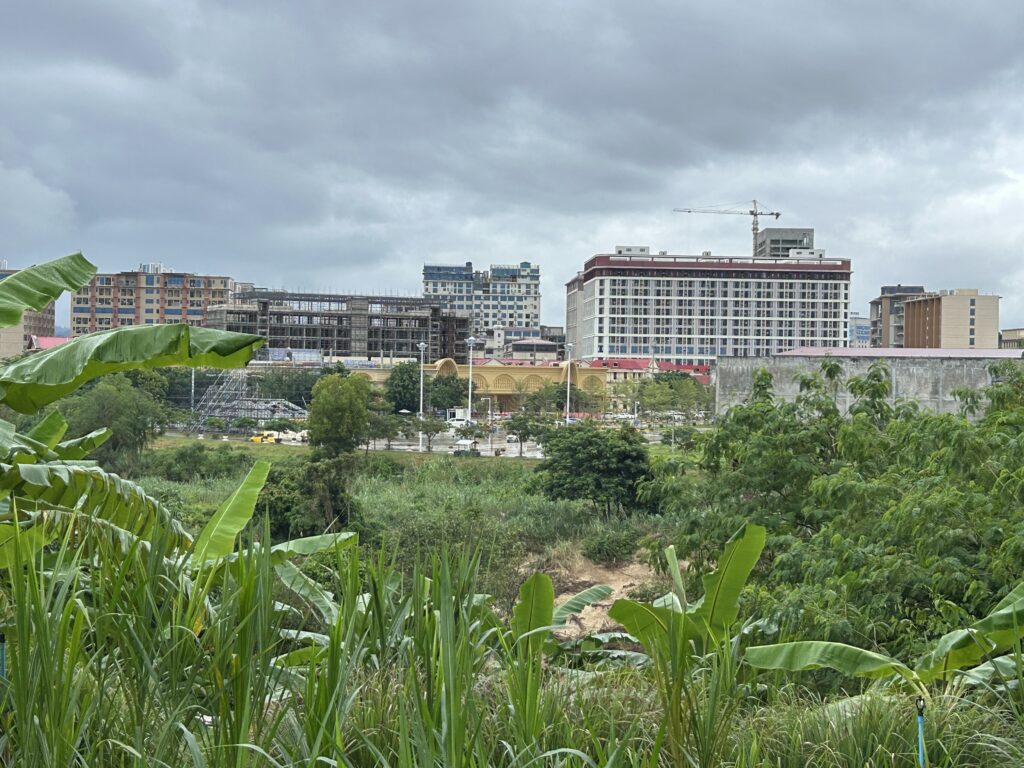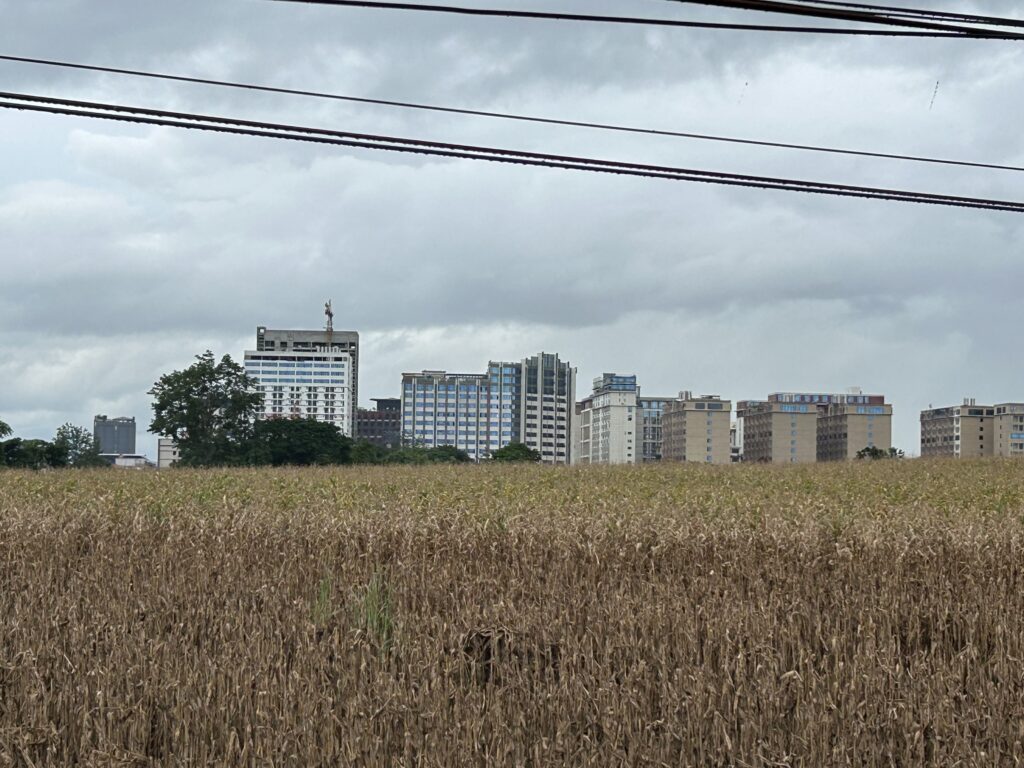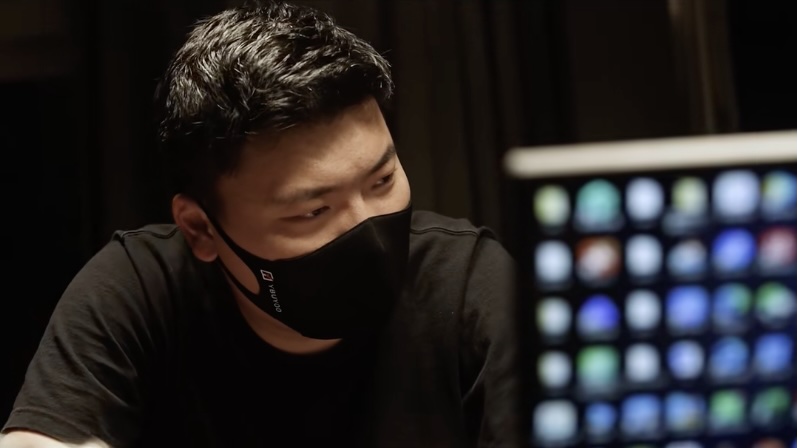Freeing victims from criminal enclaves in Myanmar, one TikTok at a time
Description
Araya Phisutthiratanaphan sat in an idling Mercedes SUV. He was on a stakeout by the Thai-Myanmar border on a dirt path that had gone mushy with rain.
A man in his 30s, he kept a pistol in his center console and a rifle in the floorboard. Outside his windshield, he could see cornstalks, droopy trees and a coffee-brown river.
“It was like … [in the] middle of nowhere,” Araya said.
On that dirt road, Araya and a teammate intended to intercept a van driven by human traffickers, whose destination loomed tall across that river — in Myanmar. A place that was a jungle just a few years ago, before the construction of a skyline of high-rise buildings, called KK Park. It’s an office park of sorts, only it’s run by crime syndicates. And instead of condos, the high rises are bare-bones dorms with barred windows.
<figure class="wp-block-image size-large">
 <figcaption class="wp-element-caption">Shwe Koko, an upstart settlement in Myanmar, is notorious for scam operations. Authorities vow to shut it down but the skyline keeps growing.Patrick Winn/The World</figcaption></figure>
<figcaption class="wp-element-caption">Shwe Koko, an upstart settlement in Myanmar, is notorious for scam operations. Authorities vow to shut it down but the skyline keeps growing.Patrick Winn/The World</figcaption></figure>Araya was summoned to the location by a plea sent to his phone by a young Chinese woman he’d never met. She’d flown to Thailand for some vague “computer job.” Two men sent by her new employers picked her up at Bangkok’s main airport. She hopped into the van, and they drove for hours. But as she neared the border with Myanmar — a notoriously lawless stretch of borderland — she panicked.
“I just stole my phone back to send this message,” she wrote to Araya, seeding her DM with key details: The van was a Mitsubishi. One of the traffickers wore a white shirt.
“Please save me!” she pleaded.
<figure class="wp-block-image size-large">
 <figcaption class="wp-element-caption">Authorities have been overwhelmed by the sheer number of foreigners who are lured into criminal enclaves lining the Thai-Myanmar border.Patrick Winn/The World</figcaption></figure>
<figcaption class="wp-element-caption">Authorities have been overwhelmed by the sheer number of foreigners who are lured into criminal enclaves lining the Thai-Myanmar border.Patrick Winn/The World</figcaption></figure>Araya intended to do just that. He carried a pistol with a bullet racked into its chamber. Araya is not a cop, however, or even a private eye. He works as an entrepreneur dealing in real estate and truck accessories. But by his count, he has assisted in nearly 50 such rescues, some directly and others by guiding men and women to escape themselves.
He became a big deal on TikTok and Douyin, China’s version of TikTok. And although he’s a Thai citizen, Araya is ethnically Chinese and posts in the Chinese language. He likes making videos about his escapades: off-road driving, shooting boar and other “cowboy stuff.” And now, he’s also shared footage of his dramatic rescues, thrilling nearly 5 million followers.
“I just like helping people,” Araya said. “And I like adventure.”
<figure class="wp-block-image size-large">
 <figcaption class="wp-element-caption">Araya Phisutthiratanaphan, based in Bangkok, Thailand, has excited his TikTok and Douyin followers by rescuing victims of crime syndicates.Courtesy of Huqidao on Douyin</figcaption></figure>
<figcaption class="wp-element-caption">Araya Phisutthiratanaphan, based in Bangkok, Thailand, has excited his TikTok and Douyin followers by rescuing victims of crime syndicates.Courtesy of Huqidao on Douyin</figcaption></figure>As for the authorities, they’re usually already overwhelmed with the sheer number of foreigners, most of them men, who are lured into criminal enclaves lining the Thai-Myanmar border. People arrive from all over — Pakistan, Kenya, the Philippines — seeking around $700 a month for “computer jobs” in air-conditioned rooms.
The work usually involves posing as an attractive woman online, seducing lonely men who have fat retirement accounts, then duping them into phony investment schemes that bleed their finances dry.
An estimated 100,000 people have flocked to these hubs for work. Some go knowing they’re going to scam strangers. But others don’t.
Araya has a special distaste for the bosses who created these compounds. They belong to Chinese crime syndicates. “They’re guys who dress in brand names, expensive shirts, gold watches, Rolls Royces, but no taste.”
But when it comes to profits, their enterprises rival drug trafficking. The United Nations estimates revenues from scam centers in Southeast Asia, mostly Myanmar, at nearly $40 billion.
The bosses’ giant homes are visible from the Thai side of the river, not far from the dorms. “You’ve got what we call the villas,” said Judah Tana, a co-founder of Global Advance Projects, a Thailand-based nonprofit that monitors the syndicates and also facilitates rescues. “Three-story mansions where bosses live. And it’s like any house you could imagine in the Hollywood Hills.”
<figure class="wp-block-image size-large">
 <figcaption class="wp-element-caption">The United Nations estimates revenues from scam centers in Southeast Asia, mostly Myanmar, at nearly $40 billion.Patrick Winn/The World</figcaption></figure>
<figcaption class="wp-element-caption">The United Nations estimates revenues from scam centers in Southeast Asia, mostly Myanmar, at nearly $40 billion.Patrick Winn/The World</figcaption></figure>These men are ruthless. They often swipe scam workers’ passports, trapping them in the enclave, and fine them for inane violations (like eyes falling shut during a 16-hour shift) until they’re drowning in debt, essentially turning them into indentured servants. Some scam workers have been beaten, even tortured.
Meanwhile, the bosses, and certain high-performing scammers under their wing, luxuriate in brothels and night clubs where meth and ketamine are virtually legal. The women satisfying their desires are powerless to complain.
This is the plight that could’ve awaited that young woman from China — the one who had sent the desperate text message to Araya’s phone.
Luckily for her, the stakeout paid off.
Eventually, Araya spotted it: an old Mitsubishi Delica — a tin can on wheels — slowly rumbling down the dirt path. Araya was terrified. But if the van crossed the muddy river on a barge, with that woman inside, he’d have no way to get her back.
Araya and his teammate hopped out, both dressed in baseball caps and tactical gear. A third friend, filming the rescue, hung back in the Mercedes. Araya rushed to the van’s passenger side window while his friend covered the driver.
“The two guys in the van? They don’t know if we are police or something,” Araya said. “They were just stuck.” Stuck in their seats. Frozen with shock.
Within seconds, the van’s door slid open. Out bounded the young woman, in a black top and skinny jeans, dashing along the dirt path — and into the waiting Mercedes SUV.
Araya and his pal left the traffickers quivering and confused, and bounded back into the SUV. He drove the woman straight back to the airport in Bangkok.
She said little during that six hour drive. “She’s like PTSD’ed. She can’t say nothing,” he said. “I totally understand.”
Various governments from China to Thailand — as well as the United Nations — have vowed to shut down the scam compounds. Power cables and fiber-optic lines were once strung across the river into Myanmar, until Thai authorities took them down. The scam compounds didn’t miss a beat though. They switched to diesel generators and Starlink, Elon Musk’s satellite internet service.
These scam towns, with skylines like many cities in America or Europe, still light up at night, illuminating the river. That stretch of Myanmar is run, not by the country’s military junta, but by a large militia that rents land to Chinese criminal networks. They exist beyond the law.
Some of the syndicates’ more vicious crimes have abated, according to Judah Tana, who maintains contacts with the militia’s top officials. He said that, after the compounds grew notorious, Chinese authorities issued five demands that are largely followed.
“The five things in place were: Stop scamming China. No underage children,” Tana said. “They were not allowed to kill anybody. They were not allowed to have extreme torture. Now, that’s interesting,” he added, “because it didn’t say any torture, it was just the extreme torture. And you had to let people leave for a reasonable cost. If they asked to.”
After dozens of rescues, Araya isn’t sure he wants to keep going, even though his phone dings with pleas almost every day. More and more, the messages are written by relatives demanding that he save a son or brother who’s disappeared into the compounds.
<figure class="wp-block-image size-full">
 <figcaption class="wp-element-caption">Araya Phisutthiratanaphan became a big deal on TikTok and Douyin, China’s v
<figcaption class="wp-element-caption">Araya Phisutthiratanaphan became a big deal on TikTok and Douyin, China’s v




